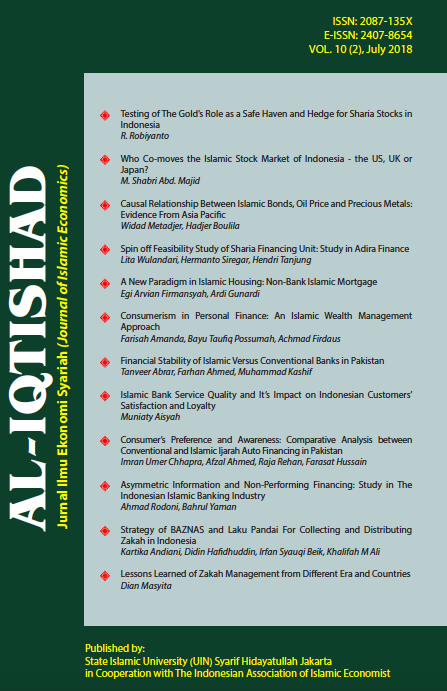Lessons Learned of Zakat Management from Different Era and Countries
DOI:
https://doi.org/10.15408/aiq.v10i2.7237Keywords:
zakat, collection, disbursement, localization, decentralisationAbstract
Zakah and its problems are as old as the Islamic civilization. This Islamic financial instrument is mandatory for Muslims who are capable and expected to reduce the poverty of the people. The potential of zakah in Indonesia reaching 217 trillion rupiah Indonesia's GDP should be able to be explored and distributed to Indonesian Muslims as effectively as possible. Potential only remains just a potential if it is not able to be realized into zakah funds collection that is ready to be distributed to the recipient who is entitled to receive it. The concept of localization/decentralization can be considered as the best way in zakah disbursement. The concept of localization/zoning or decentralization in the distribution of zakah funds closely matches the concept of Sharma in the tax disbursement issue that states that the transfer of power, resources, and responsibilities from the center to the regions is more effective in alleviating poverty in Indonesia.
References
Abdullah, R., & Haqqi, A. R. A. (2017). Zakah for Asnaf Al-Gharimun in Brunei Darus-salam: Concept and Practices. Al-Iqtishad: Jurnal Ilmu Ekonomi Syariah (Journal of Islamic Economics). Vol. 9 (2): 243-258. doi: https://doi.org/10.15408/aiq.v9i2.5092.
Al Arif, M. N. R. (2010). Efek Pengganda Zakah Serta Implikasinya Terhadap Program Pengentasan Kemiskinan (The Multiplief Effect of Zakah and The Implication to Poverty Alleviation Program). Jurnal Ekbisi.. Vol. 5 (1): 42-49.
Al Arif, M. N. R. (2012). Efek Multiplier Zakah Terhadap Pendapatan di Provinsi DKI Ja-karta (The Multiplier Effect of Zakah to Income in Jakarta). Al-Iqtishad: Jurnal Ilmu Ekonomi Syariah (Journal of Islamic Economics). Vol. 4 (1): 51-66.
Al Haq, M. A., & Wahab, N. B. A. (2017). Effective Zakah Distribution: Highlighting Few Issues and Gaps in Kedah, Malaysia. Al-Iqtishad: Jurnal Ilmu Ekonomi Syariah (Journal of Islamic Economics). Vol. 9 (2): 243-258. doi: https://doi.org/10.15408/aiq.v9i2.4002.
Kahf, M. (2000). Zakah Management in Some Muslim Societies. Jeddah: IRTI IDB.
Kaslam, S. (2009). The advancement of e-zakah for delivering better quality service and enhancing governance sphere of zakah institutions in Malaysia,” Proceedings of World Zakah Forum.
Kasri, R. A. (2016). Effectiveness of Zakah Targeting in Alleviating Poverty in Indonesia. Al-Iqtishad: Jurnal Ilmu Ekonomi Syariah (Journal of Islamic Economics). Vol. 8 (2): 169-186. doi: https://doi.org/10.15408/aiq.v8i2.3005.
Kasri, R. A., & Putri, N. I. S. (2018). Fundraising Strategies to Optimize Zakah Potential in Indonesia: An Exploratory Qualitative Study. Al-Iqtishad: Jurnal Ilmu Ekonomi Syariah (Journal of Islamic Economics). Vol. 10 (1): 1-24. doi: https://doi.org/10.15408/aiq.v10i1.6191.
Lubis, M., Yaacob, N. I., Omar, Y., & Dahlan, A. A. (2011), “Enhancement of Zakah Dis-tribution Management System: Case study in Malaysia. Working Paper. International Islamic University of Malaysia.
Qardhawi, Y. (2004). Hukum Zakat (Law of Zakah). Bogor: Pustaka Litera Antarnusa.
Sadeq, A. A. (2002). A Survey of the Institution of Zakah: Issues, Theories and Administra-tion. Jeddah: IRTI IDB.
Shehata, S. I. (2012). Limitations on The Use of Zakah Funds in Financing Socioeconomic Infrastructure. Islamic Economics Studies. Vol. 20 (1-2): 63-87.
Wahid, H., & Kader, R. A. (2010). Localization of Malaysian Zakat Distribution : Percep-tion of Amil and Receipents. Proceeding of Seventh International Conference. The Tawhidi Epistemology: Zakat and Waqf Economy.
Widarwati, E., Afif, N. C., & Zazim, M. (2017). Strategi Approach for Optimizing of Zakah Institution Performance: Customer Relationship Management. Al-Iqtishad: Jurnal Ilmu Ekonomi Syariah (Journal of Islamic Economics). Vol. 9 (1): 81-94. doi: https://doi/org/10.15408/aiq.v9i1.4010.

